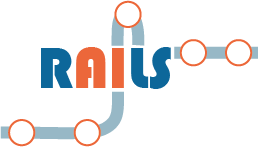Welcome to AI4RAILS 2023
The 4th International Workshop on “Artificial Intelligence for RAILwayS”
co-located with the International Conference on Optimization and Decision Science – ODS2023
September 4th, 2023
Ischia, Italy
The impact of Artificial Intelligence (AI) on the industry has been so disruptive that it gave rise to a new wave of research and applications. Several industries, mainly in logistics and manufacturing, have benefited significantly from AI adoption and this positive trend is planned to be kept in the future. Modern and future railways represent one of the fields in which AI is expected to have a significant impact in a medium to long term perspective, to get higher levels of automation. Despite this opening for unprecedented scenarios in railway systems, it also raises concerns regarding system dependability and new threats associated with a high level of autonomy.
Therefore, the first step towards the adoption of AI in the railway sector is understanding to what extent AI can be considered reliable, safe and secure. In such a context, building upon the ongoing RAILS project (Roadmaps for A.I. Integration in the Rail Sector, funded by Shift2Rail) in 2019 the AI4RAILS workshop series has been started with the aim to provide annually a forum for researchers, practitioners and business leaders to discuss and share new perspectives, ideas, technologies and solutions for effective and dependable integration of AI techniques in rail-based transport systems.
The program includes:
- Keynote speaker: Prof Mathijs de Weerdt, TU Delft.
- Technical presentation sessions: detailed program will be announced later.
The AI4RAILS workshop is supported by the AIRO stream “OPTSM Optimization in Public Transport and Shared Mobility”.
Keynote talk
Hybrid algorithms for train shunting and servicing at railway hubs

Prof Mathijs de Weerdt, TU Delft
Abstract: To support trains executing the railway timetable, they need to be cleaned, undergo security checks, and be parked in an order that matches their departures according to the timetable. When shunting yards are nearing their capacity, deciding on the order of these activities becomes so computationally challenging that state-of-the-art mixed-integer linear programming solvers fail to produce solutions for average-sized railway hubs. In this talk a number of alternative models and algorithms are explored to address this computational challenge, inspired from successes with for example search algorithms, decision diagrams, multi-agent path planning, and pebble motion. Underlying this is a more general lesson about what to include in a model, what to decide upon later, and how to make such modeling decisions.
Bio: Mathijs de Weerdt is full professor on Algorithms for Planning and Scheduling and section head of the Algorithmics Group at Delft University of Technology. His main aim is to develop new algorithmic techniques that cope with challenges prohibiting successful use of algorithmic and artificial intelligence planning and optimization techniques in practice. He mainly works on such algorithmic challenges related to the energy transition and railway transportation.
Themes and Goals
AI4RAILS workshop is addressing topics related to the adoption of artificial intelligence technologies in railway transport. AI4RAILS is set to showcase AI opportunities over the holistic railway system including traffic planning and management, passenger mobility, predictive maintenance, autonomous driving, transport safety and policy, and including mainline and high-speed railways, metro, tram, and hyperloop. We welcome various applications of AI including machine learning, neural networks and reinforcement learning, evolutionary algorithms, computer vision and knowledge-based approaches in railway transport for both freight and passenger transport. Also, both pure AI models as well as hybrid models combining AI and optimization are foreseen.
Topics of interest include, but are not limited to:
- AI for rail traffic state predictions
- AI for train timetabling, rolling stock and crew scheduling
- Self-organising, decentralised and conventional real-time rail traffic and disruption management
- Railway predictive maintenance and defect detection and prediction
- Predicting passenger demand and flows
- Data analytics for railway transport
- Using AI for improving optimization models for planning and management
- Using optimization for improving machine learning models
- Novel problems enabled by AI techniques
- Autonomous and cooperative driving, including virtual coupling
- Cognitive Digital Twins for Railways
- Explainable and trustworthy AI in railway applications
- Transferability to railways of AI approaches from other sectors (e.g., aviation, road, etc.)
- Datasets and real-world case studies
Important Dates
| January 30, 2023 | Submission of abstract opens | |
| March 31, 2023 | Early registration opens | |
| May 18, 2023 (extended) 23:59 BST | Deadline for abstract submission (max 2000 characters, space included) | |
| May 27, 2023 | Abstract acceptance notification | |
| May 31, 2023 | Deadline for early registration | |
| June 15, 2023 | Deadline for camera-ready abstract |
Abstract submission
All researchers, academics, practitioners, and students working on the conference themes are invited to participate to ODS2023/AI4RAILS submitting an abstract (max 2000 characters, space included). Please use the official Word template provided by the conference: http://www.airoconference.it/ods2023/call-for-papers
Please email your abstract directly to our AI4RAILS official email address: [email protected]
Special Issues
After the conference, regular papers can be submitted for publication in special issues of indexed international journals. Information will be provided in the subsequent announcements and on the website.
Workshop Organizers
- Nikola Bešinović, Technical University of Dresden, Germany, [email protected]
- Zhiyuan Lin, University of Leeds, United Kingdom, [email protected]
- Andrea D’Ariano, Roma Tre University, Italy, [email protected]
Workshop Program Committee
- Paola Pellegrini, Gustav Eiffel University, France
- Ronghui Liu, University of Leeds, United Kingdom
- Rob Goverde, TU Delft Transport Institute, Netherlands
- Valeria Vittorini, University of Naples Federico II, Italy
- Francesco Flammini, Mälardalen University & Linnaeus University, Sweden
- Lorenzo De Donato, Unversity of Naples Federico II, Italy
- Stefano Marrone, University of Naples Federico II, Italy
- Roberto Nardone, University of Naples “Parthenope”, Italy
- Stefania Santini, University of Naples Federico II, Italy
- Ruifan Tang, University of Leeds, United Kingdom
- Jin Liu, University of Leeds, United Kingdom
- Zhenliang Ma, Royal Institute of Technology (KTH), Sweden
- Felipe Rodrigues, Technical University of Denmark
Contact
For all questions related to the workshop, contact the organizers via email.
